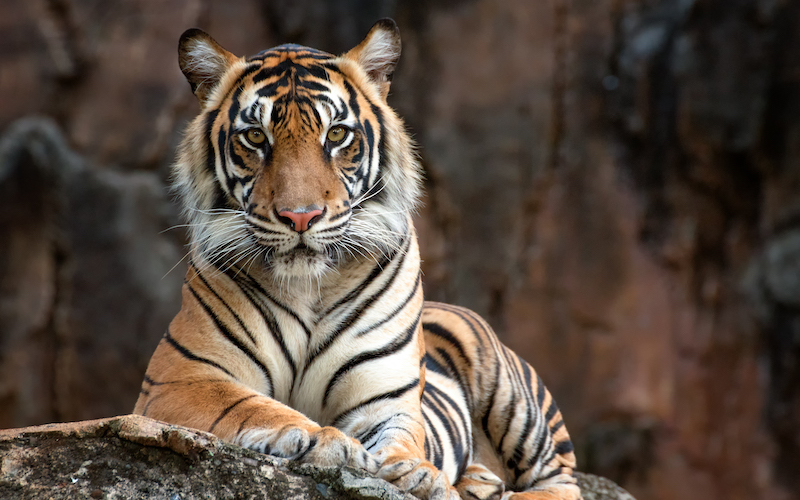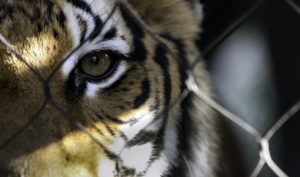
A proposed federal law would tighten regulation of private possession of big cats.
Joe Exotic, the star of the widely watched documentary, “Tiger King,” reportedly owned more than 200 tigers on his compound in Oklahoma prior to being sentenced to jail for various criminal violations. The U.S. Fish and Wildlife Service states that “the number of captive tigers in the United States alone likely exceeds the numbers found in the wild.”
Private possession of big cats poses risks to humans of brutal, deadly animal attacks. It also poses risks to the animals themselves who suffer from mistreatment and neglect.
Proposed bipartisan federal legislation would prohibit individuals who are not licensed by the U.S. Department of Agriculture (USDA) from possessing big cats—including lions, tigers, leopards, cheetahs, jaguars, and cougars. It also would prohibit public contact with big cats.
The legislation would allow current owners of big cats to keep them but would require registration of each animal so that law enforcement officers are able to respond quickly to an accident. Current owners would not be allowed to breed their big cats and would be prevented from allowing public contact with their cats.
The proposed legislation, known as the Big Cat Public Safety Act and sponsored by U.S. Representative Brian Fitzpatrick (R-Pa.) and U.S. Representative Mike Quigley (D-Ill.), has garnered support from over 200 representatives across party lines. Quigley argues that the legislation is needed to “address a serious issue that causes immeasurable animal suffering and introduces inexcusable threats to human safety.”
Although regulation of big cats currently occurs at international, federal, and state levels, critics argue that existing laws are not stringent enough and do not accomplish the goals of keeping humans and big cats safe.
The Convention on International Trade in Endangered Species of Wild Fauna and Flora (CITES) is an international treaty aimed at preventing international trade from harming endangered species. CITES provides a framework for nations to follow by stating that certain species of animals should not be traded unless certain circumstances apply. But CITES then leaves it to individual nations to create their own enforcement measures.
To comply with CITES, as well as other treaties, the United States enacted the Endangered Species Act (ESA). The ESA prohibits people from “taking” endangered or threatened species, including harassing, harming, capturing, or trapping such species. The U.S. Fish and Wildlife Service classifies all tigers as endangered, one subspecies of lion as endangered, and another subspecies of lion as threatened.
In 2016, the U.S. Fish and Wildlife closed a loophole in the ESA that exempted certain “generic tigers” from otherwise prohibited activities such as “interstate commerce and export.” The ESA does not, however, restrict movement or sale of endangered species within states. By banning breeding and non-licensed possession of big cats, the Big Cat Public Safety Act could help prevent sales of big cats.
Another federal law, the Animal Welfare Act, dictates minimum standards for exotic animal exhibitors and dealers. Using its authority under the Animal Welfare Act, USDA issued rules requiring exhibitors and dealers to obtain a license and to follow certain “humane handling, shelter, space requirements, feeding, watering, sanitation, ventilation, veterinary care, and transport” standards. Critics argue that the Trump Administration is failing to conduct adequate animal welfare inspections and that enforcement cases have declined 92 percent from 2016.
Under a law passed in 2003—the Captive Wildlife Safety Act—transporters, exhibitors, and owners of big cats do face the need to comply with some federal regulations. Under this law, no big cats are allowed to be transported across state lines for any reason, including for household moves or veterinary visits, unless the mover qualifies for an exemption. Exempt entities include individuals registered under the Animal Welfare Act, “state colleges and universities, state agencies, … state-licensed veterinarians, and wildlife sanctuaries.”
The Captive Wildlife Safety Act defines sanctuaries as non-profit organizations that do not sell big cats, their parts, or products made from them, do not breed big cats, and do not allow members of the public to have direct contact with big cats. Sanctuaries must keep records of transactions involving big cats as well as allow inspections of the facilities, records, and animals.
But neither the Captive Wildlife Safety Act nor the Animal Welfare Act prohibit private possession of big cats—nor do they require licensing for private owners. The Big Cat Public Safety Act would address both of those regulatory gaps.
Without such a federal law, regulation falls to the states. According to a 2019 report, four states do not regulate possession of dangerous wild animals at all, and six states do not ban possession of big cats as pets.
This is why proponents of the proposed federal Big Cat Public Safety Act say it is needed. They argue that “captive big cats … killed 20 adults and mauled scores of others” and that private ownership of big cats causes physical and psychological harm to the animals. These proponents explain that “the current regulatory patchwork is failing to protect public safety and animal welfare,” necessitating a federal ban on big cat possession.
Opponents of the proposed legislation argue that it would curtail “existing legal business activity.” U.S. Representative Rob Bishop (R-Utah) reportedly argued that “the proposal pits small, family-owned animal parks against big zoos, which would be able to keep their cats.”



